- Home
- Jason Webster
Sacred Sierra Page 7
Sacred Sierra Read online
Page 7
Dragging myself tentatively out of bed, I threw on my overalls and searched for something I might use to defend myself. Nothing came to hand – all my tools were downstairs, out of reach. The only ‘weapons’ available were a couple of books, a pair of slippers and a bright orange collapsible umbrella Salud usually kept in her handbag. Cursing my luck, I realised I had no choice but to head out anyway: Salud was pulling the bedcovers up under her chin and looking concerned. It was my manly duty to go out and find out what was happening, armed or not.
I poked my head out of the door and saw nothing. The gunshot had come from the direction of the old oak tree behind one of the other ruined houses. It was there that I had to go.
Bleary-eyed, I tiptoed my way over, unsure if this sunny, clear Sunday morning was about to become my last. After we had bought the farm, a friend from Valencia told us that when he bought a similar place, out in the middle of an empty valley a few miles further south, the local police had paid a visit and told him simply to shoot and bury anyone if they came round giving him trouble; they wouldn’t want to know. A feeling of the Wild West about the area was growing stronger by the day, and I felt like a cowboy about to get into a gunfight. The only problem was I had no gun.
I turned the corner round the back of the ruined house and the oak tree and patio beneath it came into focus. Rubbing my eyes, I saw a group of men standing next to half a dozen four-wheel-drives, shotguns and rifles clearly and nonchalantly tucked under their arms. By their dress and manner – all dark-green clothing and an air of cockiness that seems to come over most people once you put a gun in their hand – I understood they were hunters, out for a jaunt with a view to taking out a few wild boar and perhaps the odd partridge or two.
The chances were they hadn’t come with murderous intentions – at least not towards humans. But as I began to breathe more easily, I realised there was another problem to deal with. These men were treating our patio as though it were some public square. And they were about to go hunting on our land, something I wasn’t entirely keen on them doing. But how on earth did I go about telling a group of armed men to clear off? I had no idea. Unsure as to the protocol, I decided to go in softly.
As I walked towards them, some of them spotted me out of the corners of their eyes and turned away guiltily, like naughty children caught out by the headmaster. One or two faces were familiar: they were local men, thickset, with short limbs and closed faces. I caught the eye of one of them, an old man with close-cropped white hair, and approached him. He had what looked like a twelve-bore shotgun in his hands, while a couple of grey hunting dogs were sniffing the ground near his feet.
He smiled nervously and started talking before I even said a word.
‘Those wild boar are ripping up your trees,’ he said with a forced chuckle. ‘Causing a lot of damage.’ And he pointed over towards our almond grove.
I understood: he was doing us a favour by bringing his hunting chums out here on a Sunday morning and waking us up with his gunfire. I’d seen the trees he was talking about, and the damage was considerable, but nonetheless I wasn’t too happy about encouraging him. I’d come across hunting types before – you gave them an inch and before you knew it they’d built a lodge on your land and were shooting at all and sundry.
By this point, though, the others in the group had circled around me and were staring intently. After an initial sense of guilt, they now realised they had some kind of upper hand. I wanted this to be resolved amicably, if possible. They’d obviously been hunting here for years. And they were the nearest thing we had to neighbours. I didn’t really want our relationship to get off on the wrong foot. Then there was that little thing about them having guns.
It was an impossible situation. If I wanted peace and harmony, it seemed I’d have to back down. Perhaps, I told myself, it would only be this once. There was plenty more mountainside for them to go shooting on. Let them do their hunting today, then they’d go and, I hoped, never come back.
I heard myself wishing them luck and returned to the house, totally defeated, Salud waiting anxiously for me upstairs.
An hour or two later, after we had properly risen and had breakfast to the sound of more gunfire, I headed out to do some chores. The hunters were still huddled under the oak tree, talking to others who were milling about among the almond trees speaking into walkie-talkies. Catching sight of them I grumbled. I had been beaten – in my own castle – and it hurt.
As I pottered about, however, a scream suddenly came from inside the house. It was Salud. In an instant I sprinted up towards the front door and arrived just in time to see the two grey hunting dogs come running out, pieces of what looked like raw chicken hanging from their mouths.
‘Los perros!’ Salud shouted, seeing me speechless in the doorway. ‘What are they doing here?’
It was the excuse I realised I had been waiting for. A line had been crossed and I saw red. Pruning shears in hand, I ran towards the oak tree where the dogs had disappeared with their spoils. If they hadn’t managed to catch any boar or grouse that day, I was damned if raiding our larder was going to be some kind of consolation prize for them.
The old, white-haired man was still there, along with three or four others. This time, though, I didn’t see the guns, or the fact that I was heavily outnumbered. They’d simply gone too far and it was time for them to leave.
I filled my lungs in preparation for the bollocking I intended to give them. Just as I was about to launch into my barrage, though, I heard a voice shouting from behind me.
‘What the hell do you think you’re doing? Get away with you! All of you. Fuera!’
I turned and saw Salud barking like a sergeant major, her normally slim dancer’s body now pumped up to make her appear almost doubled in size. Without my realising, she had followed me for this moment of confrontation. Standing on slightly higher ground than the rest of us she looked daunting and commanding.
‘And take those damned dogs with you!’
For a second the hunters looked stunned. It seemed they had never been talked to like this before, let alone by a woman. Within seconds, though, they were shuffling around, collecting their gear, mumbling under their breath and calling the others in from the mountainside. It seemed hard to believe, but they were clearly about to head off.
Minutes later we watched their convoy of 4×4s driving away down the road. Salud was still raging inside, but I sensed a growing pride in her. She was surprised by the strength of her own reaction. Heading back inside the house, I poured us both a congratulatory mid-morning brandy.
‘You’ve got more cojones than me,’ I said. ‘Always said you had.’
*
I have been cutting down about half a dozen abandoned almond trees which lie in the area above the track where I want to start planting some oaks. They won’t be dry enough for firewood for this winter, but probably for next year. I bumped into Arcadio in the village and he said you must always make sure you cut wood after the ‘change of the moon’, i.e., after the full moon has passed and it has started to wane.
‘Still got some wood stored away that I cut ten years ago,’ he said. ‘Did it during the waning moon and it’s still fine. Cut another lot during the waxing moon and within six months it was useless – rotten right through.’
He didn’t know why the moon had such a powerful effect, but said everyone in the past had always insisted it was true, and he’d managed to prove it himself.
Later, I checked the phase of the moon – we’re just in the waning phase. It seems I got it right, albeit unwittingly. I wonder if there’s a particularly auspicious time for planting trees according to the moon as well. Although I’m not entirely sure whether to believe it all. Is it just the moon? What about the planets? Do they affect plants as well? How far can you take this? I can already envisage a lengthy, complicated process of star-gazing and chart-drawing before you even cut the grass at this rate.
‘Best way to carry firewood back to the house is with a rope or
string and then fling it over your shoulder,’ Arcadio said. ‘Don’t go trying to carry it in your arms: too heavy. Simplest is best.’
Sometimes I feel like a child taking remedial lessons for life in the country.
*
We had to collect our mail by driving into the village early in the morning and visiting the office of the postman in the town hall before he set off on his rounds: he only did the village and a few outlying houses; our mas was well beyond his range.
Jordi, the postman, was a small, intense, chatty man of about fifty, with short grey hair and a neatly clipped grey beard covering his pointed chin. Reading glasses were propped on the end of his nose, exaggerating the glare of his expression as he bent his head down to look over the top of them. He was also an anarchist militant.
‘Down with Capital!’ screamed the colourful posters plastered around the walls of his tiny, windowless office. ‘Worker! Do You Know Your Rights?’ It felt like a museum of propaganda from the Spanish Civil War. Jordi was still fighting the good fight of 1936, or so it seemed from the inevitable barrage I received whenever I popped in to check if we had any letters.
‘Have you seen what’s happening in Baghdad? Look at the newspaper! We’re organising a march next weekend: climbing Penyagolosa and planting a peace flag up there. We’re demanding an immediate withdrawal of Yankie troops and reparations to be paid. Oh, and we want a committee to be set up to examine the repercussions for the postal sector of the new pensions law.’
‘The Spanish pensions law? What’s that got to do with Iraq?’ I asked.
‘If we bunch together a few local issues – you know, closer to home – we reckon we can get a few more people involved, let them know about US imperialism and the danger it poses to the whole world. Wanna come along? I can get you a ticket half price.’
‘People have to pay to go on the march?’ I said.
‘Got to cover costs somehow. World peace doesn’t come cheap, you know.’
‘But I thought –’ I checked myself. Wasn’t this guy an anarchist? It made no sense, but I knew that if I asked him to explain I wouldn’t get out of there till at least midday.
‘I was wondering if there was any mail for us,’ I said.
He peered into a little wooden pigeonhole, pulling out a large wad of letters bound together with an elastic band. He flicked through them quickly, the names half-whispered through his open mouth as he did so, his bottom lip glistening under the strip lights from beneath his grey whiskers.
‘Nothing today,’ he said with a smile once he’d finished. ‘These are all for the other masos.’
‘Are there many with people living in them?’ I asked. Up our end of the valley, I knew there was no one except ourselves – all the other farms nearby were well and truly abandoned. But was that the case everywhere? Perhaps there were other people like us, quietly living in the countryside, doing up old houses and working on the land. It might even be a good idea to meet some of them.
‘Used to be a lot more,’ Jordi said, ‘before the farmers all left to come and live in the village, or down on the coast. In the days of the Republic, see’ – it seemed we were in for another lecture about the 1930s after all – ‘the government built schools all over the countryside, trying to educate people, eradicate illiteracy and all that. Built about half a dozen just around this village. It was good for the kids, ’cause they got to read and write, and good for their parents, ’cause they were still around to help on the farm.’
In the sixties, though, Jordi continued, Franco – he spat the name out contemptuously – had decided to shut down all the rural schools and build a big central one in the village instead. All the children had been forced to go to the new school, and board there during the week, as it was too far to travel to every day. So they were no longer helping on the farm, and the farmers couldn’t cope with the sudden labour shortage. And by the early seventies most of them had upped sticks and gone – abandoning their masos.
‘Within a few years new people had moved in, though,’ Jordi went on. ‘This village became famous for all the communes that were set up – Indian gurus and all that stuff. Said there was something magical in these mountains – good for meditating or something. Reckon it was just the quality of the maría up here – the grass. Perfect conditions for growing. Bloke got busted a few years back. Fields of the stuff. They send detector helicopters round every now and again with sniffer technology. Bloody ’copter nearly stopped dead in its tracks when they flew over his place – metres and dials went off the scale. Got fifteen years, they said.’
‘What happened to all the commune people,’ I asked, not a little unconcerned: the last thing I wanted to learn was that there was an ashram on our doorstep.
‘Oh, they all left,’ he said. ‘Sex scandal of some sort.’ My eyebrows rose. These quiet mountains we had come to live in were perhaps not so quiet after all. ‘Some of them still meet up here once a year, though. Get transformed into animal spirits – eagles and bears, that kind of thing: shamans.
‘Is that what you’re up to at your mas?’ Jordi asked earnestly. ‘Setting up a commune, then?’
I disabused him of the idea.
‘Tell you what,’ he said, undeterred. ‘There’s a party tonight at a mas of some friends of mine. It’s a couple of valleys over from your place. Why don’t you come along? Nice bunch of folk. I’m sure you’ll like them. Bring Salud.’
*
It was clear from the start that the inhabitants of the mas were not ‘country folk’ in the ordinary sense: not people who had been born and brought up here. They were what were sometimes called neorurales – city folk seeking a new life in the mountains. A different aesthetic, a different eye had been employed in the overall look and feel of the place. It was neat and well kept, in a relaxed and easy-going kind of way: the grass at the edge of the dirt track had been clipped, flowers in brightly coloured pots sat proudly on the windowsills and lined the tidy stone steps leading up behind the farmhouse to the garden. A painted sign with the name of the mas hung over the door, decorated with a crescent moon and stars. Another painted sign in the window made a reference to the duendes of Penyagolosa – the earth spirits of the mountain on whose slopes this farm, like our own, had been built. Colour had been added to the house as well. The usual style for masos in the area was either to leave the stone in its natural state, or else to whitewash the outer walls and then paint the insides of the windows a bright, clear blue – this was said to ward off either evil spirits, or mosquitoes, depending on who you spoke to. This mas, though, had eschewed the traditional style and painted each window with a different colour: one red, the other yellow, another purple and another orange. The effect was light and gay, and I quickly found myself warming more to the idea of meeting the people who lived here.
‘Look, honeysuckle – madreselva,’ Salud said as Jordi led us to the front door: a large, well-kept creeper had been trained to cover most of one side of the building.
We walked in through the front door without knocking, pushing our way past a blue and yellow woollen curtain hanging on the inside to keep out the draughts. The hallway had been painted a deep blue, while the floor was made up of well-worn terracotta tiles.
‘Through here,’ Jordi said, passing into an adjacent room.
A fire was blazing in an open grate with a black metal hood catching the smoke. The room was dimly lit by a couple of table lamps, the walls reflecting a thick heavy lemon colour. Two middle-aged women were lounging on a long, dirty sofa of uncertain shape, their arms wrapped around each other. From the kitchen behind them came the sound of dinner being prepared.
‘Jordi!’ One of the women on the sofa freed herself from the other’s embrace and stood up to kiss the postman on both cheeks.
‘And you’ve brought some new friends with you!’ she cried, a wide, beaming smile lighting up her heavy, greasy face. ‘Hola, hola.’ She leaned forwards to kiss us. ‘Concha,’ she introduced herself. ‘Jordi told us some time a
go there were new neighbours in the area. Come in, come in.’
She had a compact body, hard and stiff, her hair short and wiry. Her knees rubbed together slightly as she toddled back towards the sofa and gave her hand to help lift up her friend.
‘This is Marina,’ she said. ‘Watch out – she’s a witch!’
Marina was almost the same height and age as Concha, but her hair was longer and softer, and dyed a deep shocking green. She seemed shyer than Concha, her lips struggling simultaneously to smile and cover up her crooked teeth.
‘Hello,’ she said, in a deep, thunderous voice. ‘Looks like Jordi’s brought us a special delivery.’ She gave a wheezy laugh and punched her chest to dislodge the phlegm. Only now, as she stood up, did I realise she was almost twice Concha’s size, her flesh seeming to roll out horizontally in endless folds.
‘We’ve just cracked open a bottle of orujo,’ she said with a grin. ‘Want to try some?’
After a few moments a young man and woman who’d been in the kitchen came out to meet us.
‘Pau,’ said the man, wiping his hands on a cloth and then leaning over to shake my hand firmly. His beard and balding head made him look older than he probably was, I thought. But he had a strong bearing and straight, proud back. ‘This is Africa,’ he said, pointing to his girlfriend next to him. I felt two soft, almost substanceless kisses planted on my cheeks. There was something watery about her, her eyes glancing down at the floor when she spoke, her limbs like waifs’, thin and fragile.
‘El Clossa should be arriving soon,’ Concha said. It was a strange name, obviously an apodo – a nickname: it meant ‘the crutch’. As if on cue, a car pulled up outside.
The front door burst open and a couple of metal sticks poked through from the hallway while someone fiddled with the latch on the door before turning round and coming inside.
‘Jordi, you lazy anarchist bastard! You haven’t brought me any mail for weeks. Stop agitating for strikes and start doing your job.’

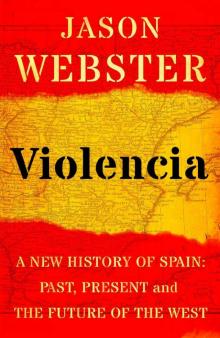 Violencia
Violencia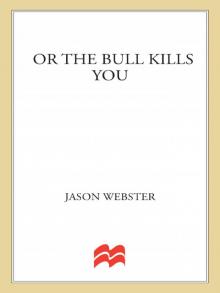 Or the Bull Kills You
Or the Bull Kills You The Killing of El Niño Jesús
The Killing of El Niño Jesús The Spy with 29 Names
The Spy with 29 Names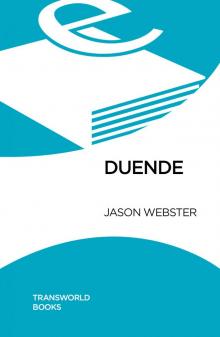 Duende
Duende Guerra
Guerra Sacred Sierra
Sacred Sierra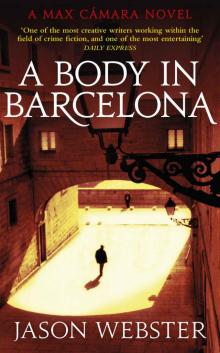 A Body in Barcelona: Max Cámara 5
A Body in Barcelona: Max Cámara 5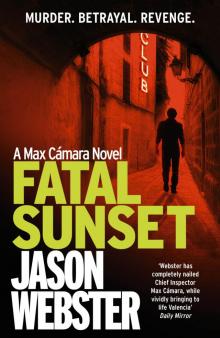 Fatal Sunset
Fatal Sunset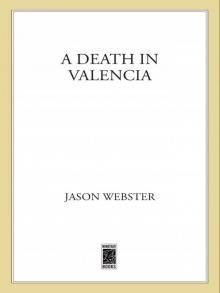 A Death in Valencia
A Death in Valencia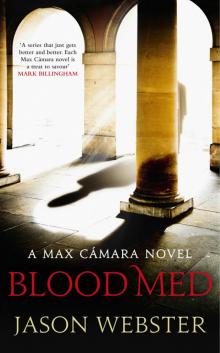 Blood Med
Blood Med Andalus
Andalus